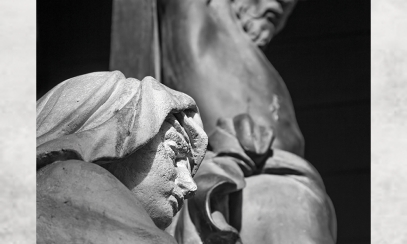
Embracing Sister Death
How should a Catholic approach death?
How should a Catholic approach death?
A friend lost his son in a tragic drowning earlier this year, and many in the Ann Arbor community gathered at the funeral of young Xavier Randolph. It was a day of sorrow but not despair. Amid the veil of tears, divine light broke through. This young man, taken too soon by earthly standards, had lived his life for the Lord, and now his death proclaimed that very same Lord. The funeral wasn’t quiet repression or sentimental distraction, it was a liturgical declaration of eternal hope. I believe that Catholic Social Doctrine has much to speak to the tragedy of death.
A friend lost his son in a tragic drowning earlier this year, and many in the Ann Arbor community gathered at the funeral of young Xavier Randolph. It was a day of sorrow but not despair. Amid the veil of tears, divine light broke through. This young man, taken too soon by earthly standards, had lived his life for the Lord, and now his death proclaimed that very same Lord. The funeral wasn’t quiet repression or sentimental distraction, it was a liturgical declaration of eternal hope. I believe that Catholic Social Doctrine has much to speak to the tragedy of death.
Xavier’s family didn’t shrink into private mourning. In solidarity with the body of Christ, they raised Xavier before the Lord, crying out, “To God be the glory.” His brother, Deacon Peter Randolph, stood before the gathered covenant community and asked the only question that can frame death rightly: Is man loved by God? That question reverberates through every Christian life, through every cry at the grave, through every soul lifted in prayer as the greatest consideration of human dignity. Yes. Each man is loved by God so much that the Eternal Son died our death so that we might live His life, and that makes all the difference for life and death.
Death, then, is not merely personal, it is necessarily covenantal, communal, and social. It calls the Body of Christ to assemble, grieve, remember, and profess: “I believe in the resurrection of the dead and the life of the world to come,” but without a sense of upholding the common good, this conviction is lost in today’s America.
A Culture That Denies Death
Today, American society has built emotional, medical, and linguistic walls around death. The dying are moved out of homes and into institutions, and funerals have been replaced by “celebrations of life.” Behind this shift is a web of modern ideological lies: Enlightenment rationalism reframed death as a scientific failure; secular humanism emptied it of transcendence; antitheist denialism taught us to weaponize our anger and grief; and transhumanism now dreams of eliminating death altogether.
This latest movement, transhumanism, is a high-tech version of what Dylan Thomas called “raging against the dying of the light,” but this time without God, without hope, and without the promise of resurrection. Ray Kurzweil and other prophets of digital salvation claim we’ll one day upload our minds into machines, yet death remains unconquered. No app, no algorithm, no robotic shell can breathe life into dust.
Simultaneously, our language is evolving to sanitize the grave. Abortion is called “healthcare,” assisted suicide is labeled “death with dignity,” and euthanasia is repackaged as “mercy.” Through such euphemisms, Americans are not only fleeing death but attempting to rewrite its meaning. Social media trivializes it, influencers mourn on filtered cameras, and TikTok reactions overshadow funeral processions. Even grief is commodified, made palatable for mass consumption. But Christian death, virtuous, hope-filled, prayed over and wept for, reminds us that life on earth is not ultimate: it reawakens eternity in the soul.
To Die Well Is to Live Well
Without the Gospel, death becomes an undefeatable thief of happiness. But standing near a dying person in Christ reshapes the soul; it is a catechesis that no classroom can provide because it teaches that this world is not our final home and that memento mori (“remember you must die”) is not morbid but freeing. The early Christians recognized this well, worshiping in catacombs among the dead because they believed in the resurrection of the body and the glory of the life to come. Even Paul VI’s 1963 instruction Piam et Constantem which, in subsidiarity and discernment of the local needs of the faithful, granted permission for cremation still showed that burial of remains was preferred. In cremation, the Church insists cremated remains be treated with the same reverence as the body, kept in sacred ground, not scattered, divided, or kept at home, again affirming the dignity of the human person and faith in the resurrection of the body.
The Church, in her wisdom, dedicates November to the dead: All Souls’ Day is not about despair but about love. We pray for our faithful departed, remembering them not as gone, but as living in Christ, united with us in the same mystical body, albeit on the other side of the veil. The Catechism reminds us, “Death is the end of man’s earthly pilgrimage, of the time of grace and mercy which God offers him so as to work out his earthly life in keeping with the divine plan.” (CCC 1013) To die well is to have lived fully in Christ, so let us not sterilize death but sanctify it, not flee from the grave but walk toward it in faith, building our lives on earth with Heaven ever in mind. Let our death be one of the loudest sermons our lives have ever preached, and like young Xavier Randolph, may our funerals declare: God be glorified!
Marcus Peter is the director of theology for Ave Maria Radio and the Credo Institute and chairman of the Diocese of Lansing’s Commission on Catholic Social Teaching. He attends St. Thomas the Apostle parish in Ann Arbor.



